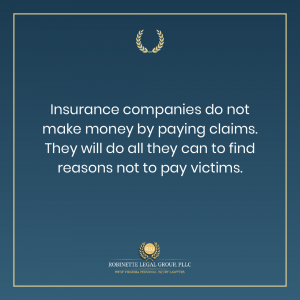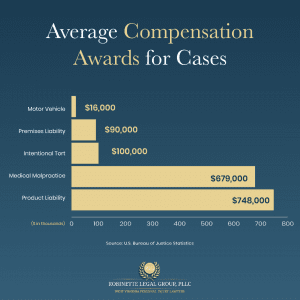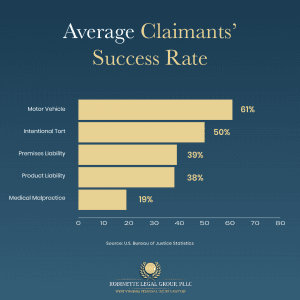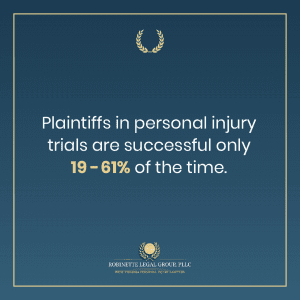How to Find the Best Personal Injury Lawyer for Your Case in 2022?
If you were injured because of an accident or while you were doing your job, then you may need to hire a personal injury lawyer to file a personal injury claim. Claims can be filed against companies, people, or even government entities. Based on the American Bar Association (ABA) guidelines, an injury case arises from neglect. If someone owed you reasonable care and neglected to provide such, then the resulting physical and financial damages form the basis of your personal injury claim.
You and the lawyer you choose must prove negligence in a personal injury lawsuit and may be required to show that the at-fault party:
- Breached their responsibility
- Caused your injuries
- Owed you a duty of care
- Caused your financial damages
You need a lawyer with advanced knowledge of personal injury laws in the state where your injury occurred. It’s crucial that you find the best personal injury lawyer who can help you get the compensation you deserve.
A personal injury attorney can handle your personal injury lawsuit before the time limit for filing a lawsuit is passed, prepare your case for small claims court or arbitration, and help you settle your personal injury claim within the statute of limitations of the state in which the injury occurred.
However, you can’t hire just any lawyer. You want the right personal injury lawyer you can really trust.

Here are some tips on how to find the best personal injury lawyer:
The practice of law is highly specialized, and it’s crucial that you hire an attorney who has experience representing claimants (plaintiffs) in personal injury cases.
Look for an Experienced Personal Injury Lawyer
Be wary of hiring a personal injury attorney who is still working for insurance companies because they may be too accustomed to taking the insurance companies side. These attorneys might not fight hard enough for your personal injury claim. It’s crucial that you’re represented by an experienced plaintiff’s personal injury lawyer so you have a higher chance of getting fair compensation.
Find a Lawyer who Wants Your Case
Remember, that hiring a personal injury lawyer isn’t enough. You’ll also need to have an attorney that wants your particular personal injury case. A personal injury lawyer could have different reasons for rejecting you as a client such as a conflict of interest.
Typically, personal injury lawyers work on a contingency basis. This arrangement means that the attorney’s fee is a percentage of what a claimant ultimately receives in compensation. If the amount you’re likely to receive is small, then most lawyers will refuse to take your case.
The reason is that a lawyer’s overhead (the cost of operating a law firm) is too high to make small cases worthwhile. Fortunately, you may still be able to get a lawyer by hiring one on an hourly basis to give you advice on particular parts of your claim.
There are instances wherein the claimant’s injuries are serious and the potential compensation is high, but a personal injury attorney would decline to take the case. A lawyer might determine that your odds of winning full compensation are low. For example, you might have been partially or largely responsible for the accident, or it might be that the person responsible for the accident might have little or no insurance coverage, or it’s hard to prove that someone else was at fault.
Sometimes, a personal injury lawyer refuses to take your case for the same reason that you might not want to hire a perfectly good lawyer – the two of you might not be comfortable with each other.
Steps for Finding the Best Personal Injury Attorney for Your Case
Research Personal Injury Lawyers Online
Go online and use resources such as Nolo.com, AllLaw.com, Avvo, Lawyers.com, and Findlaw.com to get free legal information and search for attorneys as well.
Make a list of top potential personal injury lawyers you can talk to regarding your case and look at their websites and Google reviews.
Interview Multiple Lawyers
It’s highly recommended that you talk to several personal injury lawyers so you can find one you are best matched with. You can also compare them based on their costs, their experience, and what their office environment is like. You’ll also get a good sense of expectations about your personal injury case when you meet with different personal injury lawyers. Each one will give you an idea of what your challenges might be and what your success likely is. Be cautious of personal injury attorneys who have an exaggerated sense of their success—they might not be able to back it up. It takes at least ten years of experience to become a top-performing personal injury lawyer.
Talk to Personal Injury Lawyers You Already Know
If you already know an attorney, either personally or because they have helped you before in some legal matter, then you can consider hiring the same attorney. Yet, should this attorney have limited experience representing plaintiffs in personal injury cases, then you can ask them for referrals instead.
Ask Your Family, Friends, and Acquaintances who they would recommend for your personal injury attorney
You can ask for recommendations and referrals from your friends and family. They might know of a personal injury lawyer with whom they had a good experience. This allows you to create a starter list of personal injury lawyers to interview. Talk to your friends and colleagues who have worked with a personal injury lawyer in their own personal injury claims.
However, don’t make a decision about a personal injury attorney solely based on another person’s recommendation. Different people will have different responses to a personal lawyer’s personality and style. Don’t make a decision to hire a lawyer until you’ve met with them, discussed your personal injury case, and decided they’re the right personal injury lawyer for you.
Large Law Firm or Small Law Firm?
Remember that the size of a law firm doesn’t have much to do with how well an office handles your personal injury case. Many people think that a big law firm will intimidate an insurance company into offering a higher settlement, but that’s rarely the case.
A small personal injury case can easily get lost in the shuffle at a large law firm. Additionally, big law firms often spend freely on expenses that may eat up much of your potential compensation.
The insurance companies are also aware that large law firms usually don’t put as much time or concern into a typical personal injury case compared to smaller law firms. Therefore, insurance adjusters dealing with a large law firm might make lower personal injury settlement offers since they know that a busy attorney might recommend that their clients take it.
The Lines of Communication – Find a Lawyer that You Can Talk to That Really Listens and Understands Your Situation and Case
You and your personal injury lawyer must be able to communicate well with each other. Your personal injury attorney must:
- Listen to you
- Explain things well
- Keep you informed
- Be willing to follow your ideas about how to approach your personal injury case
- Consider your input before making crucial decisions in your case
An attorney’s willingness to listen and the ability to understand their client affects how much the client can help their attorney and whether the client can somewhat control how the attorney does the job. Also, a personal injury lawyer’s willingness and ability to explain what’s happening in the case will affect your ability to make good decisions. If you can easily talk to one another, then the entire process would be much less stressful.
Works on Contingency
It can be costly to hire a personal injury lawyer since they charge hourly for their services. If you sustained injuries then you may not be able to pay out of pocket. As mentioned previously, reputable personal injury lawyers work on contingency. So, you can pay them once you get paid. It’s common for contingency amounts to be anywhere from 33% to 50%. Look for a personal injury lawyer who works within those ranges. Lawyers take their cut from your winnings and the best personal injury lawyers factor in legal fees into your final settlement so you get the most out of your claim.
Find a Personal Injury Lawyer You Can Get Along With
A personal injury case can take a lot of your time and you’ll also need to recuperate. You’ll also experience ups and downs and it’s crucial that you can openly talk with your lawyer. It’s vital that you select a personal injury lawyer that you can get along with. Your lawyer should also listen to you, answer all your questions, and explain things in a way you can understand. It should feel like your personal injury attorney has your best interest at heart. So, if you feel that they’re just taking your personal injury case for the money, then you should look for someone else.
Finding The Right Personal Injury Lawyer
It’s still best to meet with a personal injury lawyer to discuss your claim. You must also bring copies of the documents that are relevant to your claims such as medical bills, police reports, income loss information, and all correspondence with the insurance company. Don’t forget to also bring the demand letter if you have reached that stage. Take note that most experienced personal injury lawyers don’t charge for an initial consultation.
The following are a few essential things to find out from a personal injury lawyer during your first interview:
General Experience
You can start by asking about the personal injury attorney’s background and experience. You may also ask which school the lawyer graduated from – however, it’s not as important as experience in the real world. Here are some other questions you may ask them:
- How long has the personal injury lawyer been in practice?
- Does the attorney most often represent claimants (plaintiffs) or defendants (insurance companies, businesses)
- What percentage of the attorney’s practice involves personal injury cases?
- Do they mostly represent plaintiffs or defendants?
- Do they refer some personal injury cases to a third party?
- Does the lawyer have experience with the insurance company in your case or even the particular insurance adjuster?
- Who will work on your personal injury case?
- Understanding that every case is different and results vary according to the facts of each case, ask the attorney for sample case results for cases similar to yours.
In a typical law firm, the lawyers will work together on cases. Usually, less experienced lawyers and paralegals are assigned to handle routine tasks. This is beneficial if the work gets done more quickly. Also, if you’re paying by the hour, then it’s better for you not to have a more expensive senior attorney handle the routine paperwork.
Other Factors to Consider in Finding a Personal Injury Attorney
Look for an Experienced Personal Injury Lawyer
Many lawyers tend to be generalists or specialists. It’s essential that you find an attorney who specializes in personal injury and accidents. This lawyer has a better understanding of the laws that apply to your personal injury case. They will also have access to reliable medical professionals and experts to help you build your case and get treatment for your injuries.
Remember to ask the attorney how long they have been practicing personal injury law. It would be ideal if your attorney also has experience handling cases similar to yours. For example, if you’ve been injured by a defective product, then it’s critical to have an attorney with experience in product liability claims. If you’ve been involved in a car or tractor-trailer accident, then you’ll require someone who has handled these kinds of accidents before.
Ask About A Lawyer’s Success Rate
You need to hire a lawyer who has more than just the experience of taking on personal injury cases. Remember, that most personal injury claims are settled between the parties and sometimes it happens before a lawsuit is filed. Although, a few cases do go to trial. You must hire a lawyer who has successfully negotiated settlements and litigated personal injury cases all the way to the jury verdict. So, it’s vital to ask the lawyer what their success rate is. Should they fail to provide it, then they likely don’t have a high one.
The Settlement Goal
Once you have discussed with an attorney the facts of the case and the history of your negotiations with the insurance company, the attorney might give you a general opinion of how much the case is worth and how challenging it may be to convince the insurance company to pay something in that range. At this point, you must discuss with the personal injury lawyer the various ways your case could be approached, and whether they would be willing to handle it in the way you want. The different approaches may include:
- Obtaining any amount that’s higher than what the insurance company has already offered you, as soon as possible.
- Obtaining a settlement amount for you within a specific range and with as few expenses and as little hassle as possible, or
- Obtaining as much financial compensation as possible, no matter how long it takes.
Even if you’ve already asked your personal injury lawyer to approach your case a certain way, it doesn’t mean that you’re stuck with that approach. You’re always allowed to change tack as your case goes along. Additionally, you may get tired of the entire process and want your attorney to wrap things up as soon as possible. On the other hand, as your case goes along it may seem to you and your attorney that the odds have improved of getting a higher settlement than you originally expected, and now you’re willing to have your attorney fight harder than you were initially.
Let’s discuss some of the most common personal injury examples:
SLIP AND FALL ACCIDENTS
Slip and fall cases occur when an individual falls and gets injured on a property belonging to another business or person. It’s the duty of property owners to keep their premises reasonably safe from hazards so that people who visit their property aren’t injured.
DOG BITES
In most cases, the dog owners are financially responsible for injuries that occur when their dogs bite or attack others. These accidents can be particularly serious and tend to impact vulnerable individuals such as senior citizens and young children.
MEDICAL MALPRACTICE
Medical malpractice claims arise from situations in which a medical professional fails to provide care that conforms to the standard of medical care in the community. Medical malpractice victims may endure life-changing injuries or they might get killed. For example, a doctor makes a missed diagnosis or a diagnostic error that leads to incorrect treatment or no treatment at all. A wrongful diagnosis might make the patient’s condition worse and may even lead to wrongful death.
CAR ACCIDENTS
Car accidents make up the largest group of personal injury accidents in the US. When vehicular accidents occur, it’s often because an individual is not driving with an adequate degree of caution or following the posted rules.
INTENTIONAL TORTS
Unlike many other kinds of personal injury claims, intentional torts happen when one individual intentionally harms another. The common types of intentional torts include intentional infliction of emotional distress and assault.
Personal Injury Facts and Statistics
Now that we’ve discussed the common personal injury examples, let’s talk about some facts and statistics related to personal injury cases in the US.
According to the U.S. Department of Justice, Bureau of Justice Statistics, in 2005, 60% of contract, property, and tort cases involved a personal injury.
All 50 US states have some form of legal protection against negligence that results in injury. This enables injured individuals to file a personal injury lawsuit against the responsible party or parties to get compensated for their damages.
How many personal injury claims are filed each year?
It’s hard to determine the specific number of personal injury claims that are filed each year because they rarely make it to court. However, we do know that only 5% of personal injury claims make it to a courtroom. Given this data, it’s safe to say that there are somewhere between 300,000 and 500,000 personal injury cases each year in America.
The Department of Justice came up with a breakdown of the different types of personal injury cases. Let’s take a look at the numbers:
- 52% result from vehicular accidents
- 5% result from product liability issues
- 15% result from medical malpractice
- 28% result from other causes
How often do victims win their personal injury cases?
Saying that a person “won” their personal injury case is a loaded statement in the US. It’s typically used to refer to someone who received compensation for their injuries. Yet, the most common way a person gets compensated is through a settlement before the case ever goes to court. So, it’s impossible to determine how many settlements are agreed to out of all the personal injury claims filed. We can also look at the cases that go to trial but you have to consider that these cases have unique circumstances so they can’t be used as an indicator.
Based on a report on trial outcomes from the Department of Justice, it shows that roughly half of the personal injury claimants win their cases at trial. The success rates varied depending on the nature of the personal injury case:
The success rates for:
Intentional Tort Cases was roughly 50%
Product liability cases was roughly 38%
Dog bite trials was roughly 61%
Premise liability cases was roughly 39%
Medical malpractice cases was roughly 19%
Car accident trials was roughly 61%
The success rates vary since the type of personal injury incident varies greatly. What happens in a medical error is extremely different from a car accident. Take note that personal injury cases require experience and expertise to navigate. You may be able to file a claim without a lawyer, but it’s not recommended because insurance companies, negotiators, and lawyers will have more relevant experience than you don’t have. It’s best to consult an experienced lawyer to level this playing field.



How much do personal injury claimants normally get in compensation?
It’s vital to consider that dollar amounts are difficult to gather and are estimates when reviewing the amount of compensation that victims get as a whole. This information was gathered using the largest 75 US counties as a sample. The numbers below are median and it’s calculated by dividing the total amount of money received by how many individuals filed a claim. Do remember that some individuals received more and some people received less.
From this study, it was found that the median award amount nationwide was:
$90,000 for premise liability
$27,000 for all torts
$100,000 for intentional injuries
$748,000 for product liability cases
$18,000 for dog bite and animal attack cases
$697,000 for medical malpractice cases
$16,000 for vehicular accidents cases
How long will a personal injury case take?
While there’s no definitive amount of time for a personal injury case, we can look at the experience of personal injury lawyers. Based on the anecdotal evidence, the average personal injury claim that settles without going to court is nine to eighteen months. Also, when the personal injury claim goes to trial, it takes about 2 years.
You have to consider that your personal injury case is a unique undertaking and may have a timeline that varies greatly from other cases. The typical steps involved in a personal injury lawsuit that create the timeline may include:
- investigation of the cause
- diagnosis of your sustained injuries
- identification of the at-fault party
- valuation of the recoverable damages
- filing of the compensation lawsuit
- negotiating the monetary settlement
- going to court if a settlement cannot be reached
Additionally, your timeline may also depend on how long it takes to receive, review, and decide to accept a settlement offer. Do note that the final decision is always yours so the timeline for this portion of the process may depend largely on you. The personal injury timeline may also depend on laws in your state that govern the insurance companies. Insurance companies may be required to respond to your inquiries and issue agreed-upon payments within certain timelines. Your attorney may explain these laws to you and educate you on how they affect your financial recovery. Your personal injury lawyer may also advise you to wait before accepting a settlement offer since it may take time for the full financial aftermath of your injuries to become clear. Once all income statements, medical bills, property repair or replacement bills, and other crucial evidence have been collected, your attorney may begin or complete the negotiation process.
If your lawsuit is resolved in court, then your timeline may be longer since each party has to complete certain actions on behalf of their client. Each party may prepare their case, conduct their investigation, file legal documents, and wait for the available court date. Your personal injury lawyer will explain all the steps involved and the possible timeline.
Conclusion:
At Robinette Legal Group, we use our skill and experience to provide you with the best quality representation in order to achieve the highest possible result for you and your loved ones.
Check out our client testimonials so you get an idea of how we handle different personal injury cases. Feel free to contact us for a free case evaluation or to answer any questions you have about hiring a personal injury lawyer. 304.594.1800
Our Awards and Certifications











Practice Areas
- Personal Injury Overview
- Bicycle Accidents
- Brain Injuries
- West Virginia Burn Injury Attorney
- Car Accidents
- Commercial Delivery Truck Collisions
- Construction Site Injuries
- Defective Product Injuries
- Dog Bite Injuries
- Drunk Driver (DUI) Accidents
- Gas Explosion Injuries
- Insurance Claim Disputes
- Mining Accident Injuries
- Motorcycle Accidents
- Pedestrian Accidents
- Medical Malpractice
- Rear-End Collisions
- Scaffold & Ladder Fall Injuries
- Slip And Fall Accidents
- Spinal Cord Injuries
- Truck Accidents
- Uninsured Motorists
- Work Accidents
- Wrongful Death



